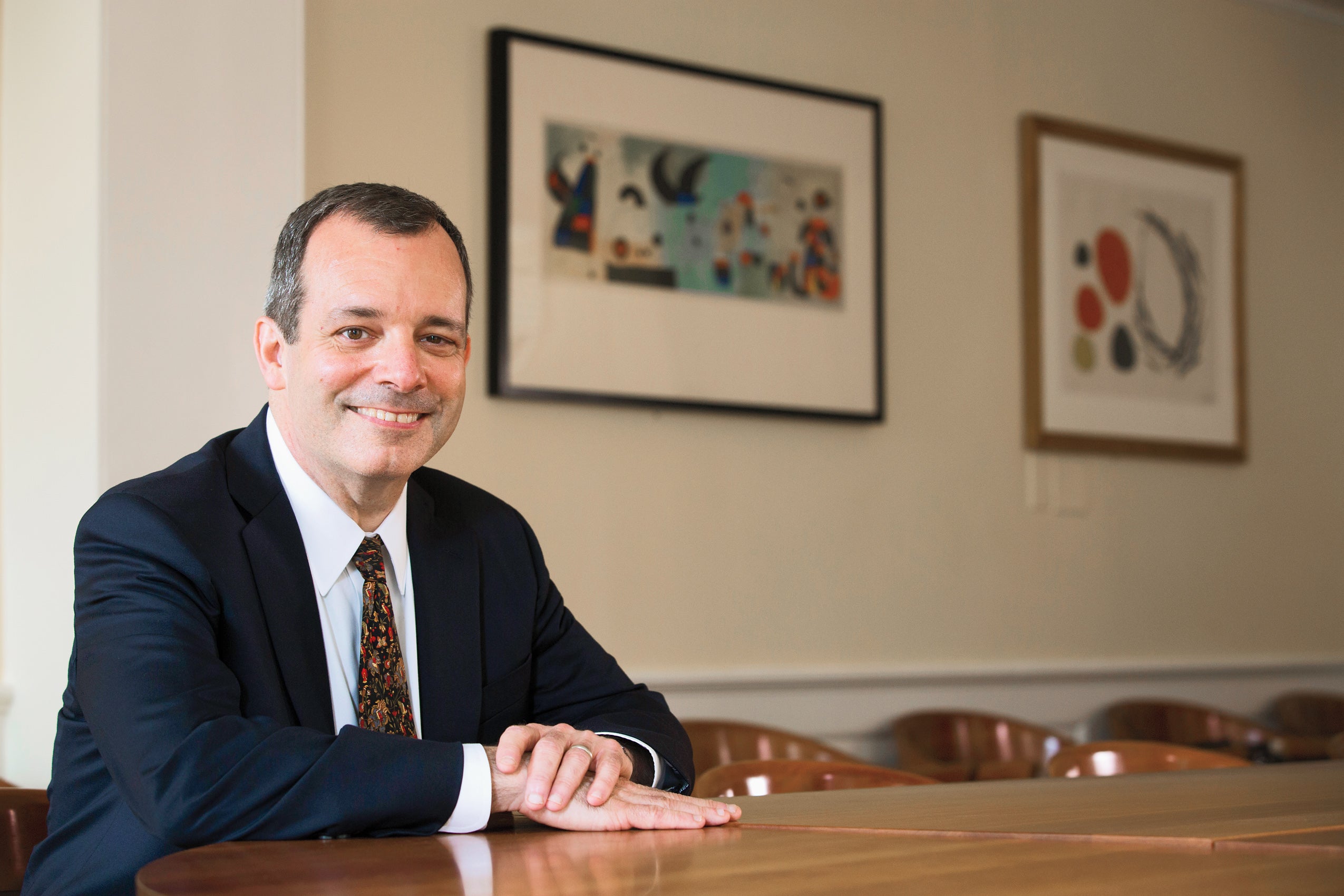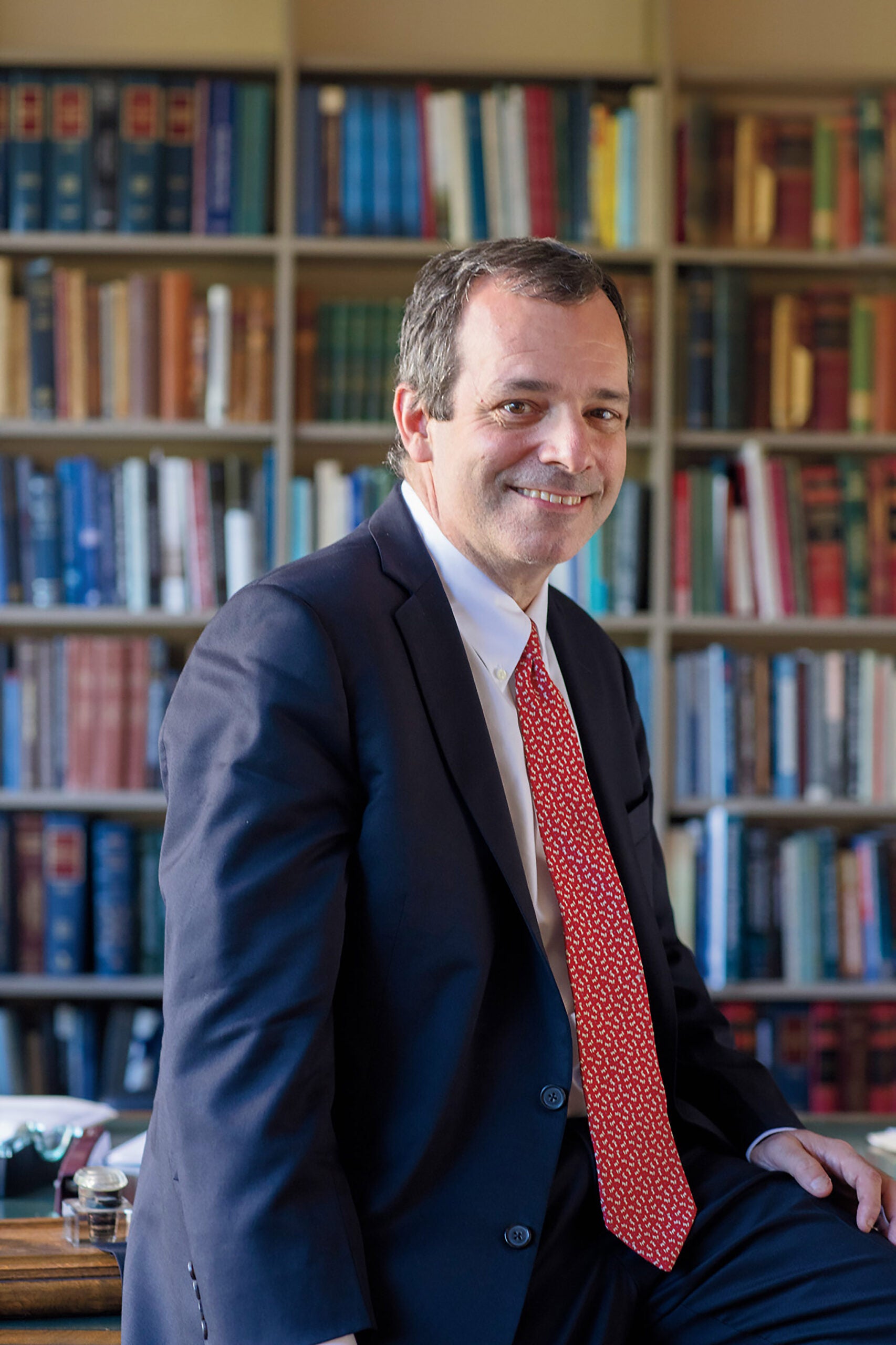In July, John Manning ’85 became the 13th dean of Harvard Law School. A scholar of public law, Manning has taught courses on administrative law, federal courts, legislation and regulation, separation of powers, and statutory interpretation. He joined the Harvard Law faculty in 2004, after a decade at Columbia Law School. Early in his career, Manning clerked for Judge Robert H. Bork on the U.S. Court of Appeals for the District of Columbia Circuit and for Justice Antonin Scalia ’60 on the U.S. Supreme Court. He also worked in the U.S. Department of Justice as an attorney-adviser in the Office of Legal Counsel and as an assistant to the solicitor general, as well as in private practice. In late September, as the school had begun to celebrate its bicentennial, Manning spoke with the Bulletin in the dean’s office in Griswold 200 on a range of topics, including getting advice, giving it and “doing disagreement right.”
You started here 35 years ago as a 1L and have taught here for 13 years. Given your long relationship with the school, what’s it like now to be dean?
JM: I’m so happy to have the opportunity to be dean. I personally feel an incredible debt to this law school. I’m the first in my immediate family to graduate from college. I’m the first in my family to go to law school. Harvard Law School has enabled me to lead a life of professional fulfillment that neither I nor my parents could ever have dreamed of. And this is one of the things about this law school that I think is so special: It does that for lots of people, year in and year out, generation after generation.
“To help the members of this community do their best work and chase their highest aspirations is a great privilege.”
In this bicentennial year, it’s also really astonishing to see how much this law school has contributed in so many different areas, in so many different fields, in so many different contexts. The chance to help the members of this community do their best work and chase their highest aspirations is really a great privilege.
One of the new initiatives that you’ve launched is a mentoring program to increase opportunities for students to receive guidance. What are your hopes for this initiative, and why is it especially important to you?
I think mentoring and advising are so important in higher education, and in life. I’m on the University’s Task Force on Inclusion and Belonging, and the literature shows that mentoring has high value added. It helps people better understand and absorb what they’re learning. It helps them make important career decisions. It also just helps them navigate complex institutions. And I’ve learned that the value added by mentoring is not evenly distributed across the population—and that, often, people who are first-generation or come from less-advantaged backgrounds get much more value added from great advising and mentoring.
I want to make sure that our students have lots of opportunities to develop good, organic mentoring and advising relationships. New initiatives this year include a program that taps into our 1L reading groups by making the instructors official advisers to their students. We’ve also created a peer mentoring program. We’re now in the process of working on expanding an alumni mentoring system. Stay tuned!
As you think back on your own life, is there a pivotal mentoring moment that stands out?
I’ve had a lot of great mentors in my life, and they’ve taught me different things. Some of them have taught me how to be a lawyer and how to think like a lawyer. Some of them have been strong, clear writers who taught me a lot by critiquing and rewriting my drafts, sometimes more than once. And some of them have imparted important lessons about what it means to be a good lawyer. And I don’t mean that in the sense of an effective lawyer; I mean a lawyer who is good.
One of my mentors when I was in Washington said to me, “Your commitment to principle is only tested when it hurts.” And I thought, That’s very profound advice about how to think about one’s career in the law. Another said to me: “You are responsible for your own integrity. No one can take that away from you. You have to give it away.” That’s also very profound advice for a young lawyer. Another taught me, “It’s amazing how much you can get done if you don’t care who gets the credit.”
I worked in Washington quite a long time. And, during that time, I watched a lot of successful, important public servants making a lot of very hard decisions. Those were all really good learning experiences for me.
You’re beginning your tenure when the school is reflecting on its 200-year history. How is becoming dean at this moment resonating for you?

What’s extraordinary about this moment is that the bicentennial puts a really sharp focus on a couple of things about Harvard Law School that are unique. Harvard Law School is vast in scope and also truly excellent. And those are two things that are very hard to do simultaneously, and to do so for such a sustained period of time is really quite remarkable. And so you sit and you look back on our history, you see how many things started here—how many innovations, and ideas, and legal movements began at Harvard Law School. This is the place where Dean Christopher Columbus Langdell [LL.B. 1854] started the case method and the Socratic method of teaching law. The Harvard Legal Aid Bureau was the first student-run legal aid organization and the first student-run practice organization. (In a lot of ways it was the precursor to clinical education.) Harvard Law School graduates played an integral role in founding the NAACP and in focusing the bar on pro bono representation and the duty of lawyers to help those in need.
Then there’s the fact that more than one in six of all the Supreme Court justices in U.S. history were educated, in whole or part, at Harvard Law School. About one in eight of our attorneys general went here. Then the number of Cabinet officers, senators, representatives, governors, and important officials in state and local government who went to Harvard Law School is just staggering. And then you look around the world, and you see the same thing: heads of state, justices, judges, ministers of justice, high government officials trained at Harvard. It’s exhilarating to see the impact that this school has had throughout the world.
“Our students want to go out and do big, important things—to change the world for the better.”
Our graduates are also great leaders in the private and public interest bars. They are great leaders in academia. They are great innovators in business, finance and high technology. The amazing thing is that you see Harvard Law School graduates making large, terrific, game-changing differences in field after field throughout the world. Indeed, it’s kind of amazing to step back and realize that Harvard Law professors or graduates are often the leading voices on both sides of an important public debate. And that’s very exhilarating, too.
You’ve become dean at a time when divisions among Americans are strong. What’s the importance of law, and law schools, in this environment?
As I said to students in my orientation speech this fall, one of the things I didn’t understand when I was a 1L 35 years ago, sitting in Sanders Theatre listening to my dean speak, was how central it is to a lawyer’s education to learn to disagree. When our legal system is working at its best, you will almost always be faced with the best argument against your position. That’s the whole idea of the adversary process. And what that means is that in order to be an excellent lawyer, you have to take seriously the arguments against your position.
And so what I tell my students, and what I hope they internalize, is that they’re going to be better lawyers if they listen generously to those who have a different position from theirs, if they take seriously the counterarguments. And that I think is something that Harvard Law School has done and must do extremely well. Because we’re so large and so diverse, our students are exposed to all kinds of different methodologies and approaches and perspectives and lived experiences—in the classroom and in their interactions with teachers and peers outside the classroom.
And what that means is that here at Harvard Law School, we have an opportunity to do disagreement right—to be respectful of one another, to take opposing arguments seriously, and to demonstrate that our differences can be a source of strength and learning.
What do you look forward to in your first year, and what are some of your goals for the school?
I like to learn, and I’ve spent my first three months on the job doing a lot of listening. I’ve met with my faculty colleagues. I’ve met with many, many members of our terrific staff. I’ve met with many, many students. The first year will be a chance to learn more about the law school—and about the goals and ambitions of our community.
“I want to help foster and support an environment in which we are really helping to further knowledge, understanding, and debate about things that matter.”
I’ve discussed with our community three big goals for the law school. First, I want it to continue to be a vibrant, exciting, electric environment for people to learn, to exchange ideas, and to help shape and define the large questions of today and tomorrow. It’s a moment in history when law is very important, and in which there are lots of issues that any law school should be debating, discussing, and weighing in on. So I want to help foster and support an environment in which we are really helping to further knowledge, understanding, and debate about things that matter.
And second, I want us to think hard about what we teach, and how we teach. What I’ve observed about Harvard Law School is that our students are very ambitious, in the best sense. They want to go out and do big, important things—to change the world for the better. And I know that our faculty has a sense of mission that flows in part from that sense, that we send so many leaders out into the world. We want to make sure that we’re teaching the subjects, and using the cutting-edge teaching methods, that will best prepare our students to be the best 21st-century lawyers and leaders they can be.
And then third, I want to help deepen our sense of community. I want all members of this community to feel that this is their Harvard. Programs like the mentoring initiative are part of the way we’re working on that goal, to make sure that everybody feels that we’re hearing them, and that we’re doing all that we can to help them realize their highest aspirations.
